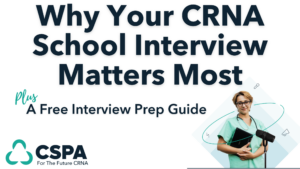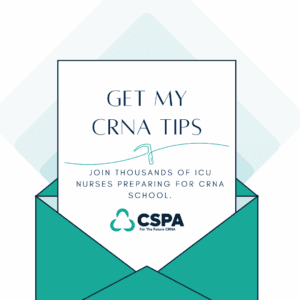
Looking for the golden ticket into your dream CRNA program?
Spoiler alert: it’s not just about your GPA or ICU experience.
If you want to get accepted into CRNA school, you need to nail your CRNA school interview.
With hundreds of applicants per cohort and limited spots, standing out on paper isn’t enough. The CRNA interview is where admissions decisions are truly made.
This blog will show you why the CRNA interview process matters most—and how to start preparing now so you’re not scrambling last minute.
Last Updated: July 17th, 2025
Get Your Free CRNA School Interview Prep Guide
Free CRNA School Interview Prep Guide Click Here
Join the Free CSPA Community! Connect with Aspiring CRNAs, Nurse Anesthesia Residents, practicing CRNAs, and CRNA Program Faculty Mentors who are ready to support you. Get real answers and expert guidance in a welcoming space that’s free from misinformation and negativity. You don’t have to do this alone! Join Now: https://www.cspaedu.com/community
Want Guaranteed CRNA School Admission? Learn More about the CSPA 12-Month Intensive Here: https://www.cspaedu.com/meblfkto
—
Your CRNA Interview is What Gets You Accepted- Here’s Why
After speaking various program faculty from across the country I have learned what the golden ticket into an anesthesia program is all about.
You are not guaranteed a spot because of your 4.0 GPA or even several years of high-acuity ICU experience.
In reality, your application is only as good as the person behind it. This process, known as the CRNA School Interview, where program faculty in charge of your future are trying to figure out who you are, is not perfect.
Sometimes it can come down to a whopping 10 minutes. 10 minutes, maybe 20, for a CRNA school interview. In many cases, that’s it! That’s all the time you get to showcase who you are, your experience, your WHY and stand-out as the future Nurse Anesthetist you know you are.
Your Interview Will Make or Break You
I know a lot of you are busy trying to do all the things to boost your application. Which you should be. But do not forget that doing well in your CRNA school interview is just as important as getting the interview- if not more.
You can have a stellar application and the interview committee could be looking forward to meeting you.
However, once you walk through those doors or hit enter on the virtual meeting this is where your actual acceptance is on the line.
Your application will get you the interview but the INTERVIEW is what will get you ACCEPTED.
Let me repeat that: Your application is what will get you the interview. Your interview is what will get you accepted.
Programs are receiving 100s of applications for only a handful of seats per cohort. Standing out on paper is one thing– standing out in the interview is crucial.
Therefore, preparation should start way before you get asked to interview. Yes, way before you even submit your application!
Time and time again, I receive frantic messages from aspiring CRNAs who have recently been invited to the CRNA interview, but they have not started preparing, and now only have a month or even a few days to do so!
Why does this happen?
If You Plan to Apply, You Should Plan to Interview
That seems like a simple statement. However, the vast majority of nurses simply apply, thinking they won’t get asked to interview. They actually tell me this when reaching out!
“Jenny, I submitted my application but I really didn’t think I’d get invited to interview! Now I’m panicking”
Messages like this fill my inbox, and it honestly leaves me scratching my head a little. Why bother applying if you don’t think you’ll get an interview?
You are putting at least a year’s worth of effort, time and money into your application (between ICU experience, leadership roles, CCRN, GRE, shadowing, etc.)…
Please don’t do this to yourself. You should start prepping for your nurse anesthesia school interview while working on your application.
Why?
Some schools only give a 4-8 day notification before the interview.
4-8 DAYS… not weeks. If you have not been preparing all along, you will not have time to do so by the time you find out you have an interview.
That’s simply not enough time to study clinical CRNA interview questions and answers, rehearse personality and EI style questions, or even get feedback on your delivery via mock interviews or coaching calls.
And remember, it’s not all about what you know. CRNA schools will push you to the edge of your knowledge base during the interview.
They do this to see how you respond under pressure, can you communicate your critical thinking process clearly and effectively. Are you willing to be part of a team, ask questions or ask for help?
Another thing to keep in mind- CRNA school interview panels and admissions committees aren’t just looking at you, like you’re a solo-applicant.
While you may be an individual applying to CRNA school, they are putting together a cohort of students. They’re evaluating how well they think you will work with your classmates for a very grueling three years.
Your success depends on you preparing for your interview from the day you step foot into the ICU or from the moment you decide CRNA is 100% the career path for you. Clinical interview prep, emotional intelligence interview prep, personality and showcasing who you are will all be crucial.
How to Prepare For Your CRNA Interview- Starting Today
Here are my top CRNA interview prep tips:
1. Research the Program
-
Learn their mission, values, and culture.
-
Attend open houses to connect with Program Faculty and current SRNAs.
-
Bonus! Utilize CRNA School Prep Academy’s Free CRNA Program Discussion Board to review interview styles (if known), or connect with recent interviewees.
*While knowing the interview style can be helpful, please don’t rely on this detail alone in your CRNA interview prep- things can change year to year, or even interview to interview! CSPA strongly suggests that you be well-rounded in your preparation, regardless if the interview style is known or not.
2. Practice Common CRNA Interview Questions
-
Start a binder of common CRNA interview questions and your answers.
-
Review clinical interview questions for ICU nurses, including critical care meds, ventilator settings, and hemodynamics.
-
Don’t forget emotional intelligence and “tell me about yourself” nurse interview questions. This post contains several practice questions you can review, complete with suggestions on how to formulate your answers.
3. Utilize CRNA Interview Prep Courses
-
Explore CSPA’s Interivew Learning Pathway or new Microcredentials in Pharmacology, Pathophysiology, and Emotional Intelligence. These were designed by CRNAs and program faculty to help you think like a nurse anesthetist, a great way to ensure you stand out in your application and interview!
-
CSPA offers deep-dives into several clinical topics on our free podcast. Led by CRNA program faculty, these educational episodes are great ways to prepare for your interview as well.
Some of our favorite episodes include: ARDS, Cardiogenic shock, the ANS, ABGs, Airway Management, Pain Management, Ultrasound Physics, Ketamine MOA and more.
-
Take the CRNA Interview Crash Course. If you’re low on CRNA interview prep time, the CRNA School Prep Academy Interview Crash Course contains the best of our interview prep, ready to whip your skills into shape FAST!
*Remember, whether you use our tools or other resources, you need to make the interview answers your own. CRNA programs will know if you use the sample responses you’re provided in prep courses or study guides. Don’t be that person. Add your own experience and insights to formulate your own, unique answer.
4. Use Mock Interviews
Participate in a CRNA mock interview with faculty or peers. Practicing aloud is key to refining your answers and body language.
We offer structured small-group CRNA mock interviews inside CSPA, led by Program Faculty who provide on-the-spot feedback, critiques and advice to student participants. Over 20+ recorded mock interviews live inside the Academy to review in between our live sessions. You can also book individual one-on-one CRNA School Mock Interviews via TeachRN.com
And #5- The VERY best way to prepare for your CRNA interview is to learn as you work.
You should be challenging your knowledge when you see unfamiliar drips or disease processes. As I mentioned above, you should be asking why and how in these situations. Make a study binder to reference later. Take notes of challenging or triumphant patient or coworker situations, so you have examples to reference in your interview later.
I know the application process is busy, and leaves very little time to study while also working and tending to family or personal life. This is why learning as you work, and starting NOW, will set you up for the most success once CRNA interview day comes.
However, once you hit submit on your application, please do not take a leave of absence. Study and prepare like your future depends on it. Because…. it does.

CRNA School Interview: The best way to prepare for the CRNA interview is to learn as you work.
Over the years, I have heard over and over from CRNA interview panels that sometimes unimpressive applicants do great in the interview and gain acceptance while impressive-on-paper applicants completely bomb the interview and get rejected.
Again I repeat- the application is what gets you the interview, and the interview is what gets you accepted.
Free CRNA School Interview Study Guide
I try to tell my students the interview is like preparing for the world series, a TED talk, or a championship game. You need to practice!
Most of us do not routinely interview all the time and possibly have only done so less than a handful of times in our adult career.
This means you will not be ready for that TED talk or championship game unless you have been preparing all along.
Grab your Free CRNA Interview Study Guide here: https://www.cspaedu.com/questions
Talking about yourself is challenging for most of us because we do not spend a lot of our time self reflecting. Sometimes self-reflection can be disappointing or even hard.
However, I encourage you to get to know yourself, your strengths and weaknesses. Once you identify your weaknesses come up with a plan to experience them more often and try to adapt or change so you can make improvements.
By putting yourself into situations that you are uncomfortable you will grow and learn from them. You can then use these learning points to express growth when your interview panel points out your perceived weak points or asks you to do so as a self-identifying exercise.
Do not underestimate the power of practice and remember one, two, or even three NO’s does not mean it is over for you. It is all practice until it is not and you get that YES.
Want more insights? Sign up for my FREE LIVE Webinar “Stand Out & Get In” to learn everything you need to know about getting in to CRNA school.
Now let’s nail that interview!
Related Topics:
- CRNA Interview Practice Questions: Clinical and Emotional Intelligence Interview Questions & Answers
- CRNA School Cost: A Comprehensive Guide to Paying for CRNA School
- How Competitive is CRNA School?
- Questions to Ask in Your CRNA Interview
- ICU Experience for CRNA: Preferred ICU Specialties for CRNA Admissions
Frequently Asked Questions:
Q1: Why is the CRNA school interview so important?
A: The interview is often the deciding factor for acceptance into a CRNA program. While your GPA and ICU experience may get you the interview, it’s your performance during the interview that determines if you’re accepted.
Q2: When should I start preparing for my CRNA school interview?
A: You should begin preparing as early as possible—ideally while you’re still working on your application. Some schools give only 4–8 days’ notice before the interview, so waiting until you’re invited can leave you underprepared.
Q3: What types of questions are asked during CRNA interviews?
A: CRNA interviews may include clinical questions on topics like hemodynamics, pharmacology, and ventilator settings, as well as personality, leadership, and emotional intelligence questions.
Q4: How can I prepare for CRNA interview questions about my weaknesses?
A: Self-reflection is key. Identify your weaknesses early, make a plan to improve them, and be ready to talk about how you’ve grown. Interview panels appreciate honesty and insight into your personal development.
Q5: What resources can help me prepare for my CRNA interview?
A: CRNA School Prep Academy offers tools like the Interview Crash Course, free podcast episodes, small-group and 1:1 mock interviews, and a free CRNA Interview Study Guide to help you prepare effectively.
Important Links
Check out the Mock Interview Library, the 5 Day Interview Prep Challenge and more inside CRNA School Prep Academy here!
Grab your FREE copy of 150+ interview questions here!
Join the Free CSPA Community! Connect with Aspiring CRNAs, Nurse Anesthesia Residents, practicing CRNAs, and CRNA Program Faculty Mentors who are ready to support you. Get real answers and expert guidance in a welcoming space that’s free from misinformation and negativity. You don’t have to do this alone! Join Now: https://www.cspaedu.com/community
Get access to application & interview preparation resources plus ICU Educational Workshops that have helped thousands of nurses accelerate their CRNA success. Become a member of CRNA School Prep Academy: https://cspaedu.com/join
Want Guaranteed CRNA School Admission? Learn More about the CSPA 12-Month Intensive Here: https://www.cspaedu.com/meblfkto
Get CRNA School insights sent straight to your inbox! Sign up for the CSPA email newsletter: https://www.cspaedu.com/podcast-email
Book a mock interview, resume or personal statement critique, transcript review and more: www.teachrn.com





Great content!
Thanks, Ryan!